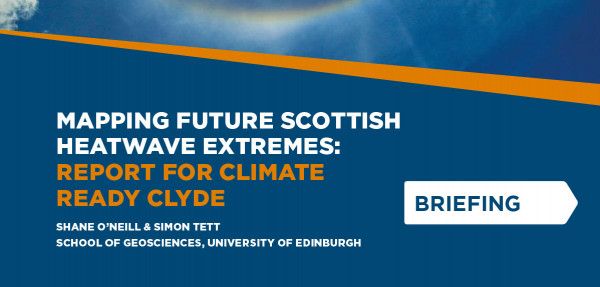New approaches needed in Glasgow city region to cope with future heatwaves
A new report released today by climate adaptation group, Climate Ready Clyde has issued stark warnings around high forecasted temperatures in the West of Scotland and their potential to affect public health and infrastructure.

Prepared by academics at University of Edinburgh, the findings in Mapping Future Heatwave Extremes are based on the MET Office’s official UK Climate Projections, which provide the most up-to-date assessment of how the climate of the UK may change over the 21st century.
The new data projects increases in the number of heatwave days per decade in the Glasgow City Region, and maximum temperatures rising from the current 28 degrees, to 32 degrees in the 2050s and 34 degrees in the 2070s.
The work builds on Climate Ready Clyde’s Climate Risk and Opportunity Assessment, which was released in April and highlighted the potential for future heat impacts in Scotland.
Heat impacts have begun to be felt, with last summer’s heat causing the roof of Glasgow Science Centre to melt, and causing rail buckling in Wishaw, North Lanarkshire.
James Curran, Chair of Climate Ready Clyde explained the potential risks to human health:
“The prospect of temperature rise might seem attractive, but it will pose a wide range of challenges to Glasgow City Region and we need to make adjustments to cope. Heatwaves can for example result in premature death and illnesses, particularly affecting older and younger people, and exacerbate existing illnesses such as cardio-vascular and respiratory diseases.
It also shows that as well as compounding existing challenges such as flooding, climate change will bring us new hazards which we will need to address”.
“Urban areas in the region may feel the heat most acutely. This is due to the urban heat island effect which leads to higher temperatures in densely populated urban areas. Glasgow city centre already has one of the most significant ‘urban heat island’ effects in the UK and this is something we must address to avoid problems as temperatures rise in the future.”
Kit England, Programme Manager for Climate Ready Clyde added:
“The temperature increases projected in this report could adversely affect the performance of health and social care services in the region, including NHS estate by impacting on the ability to function and serve populations during extreme weather. This includes disruptions to many of the infrastructure services the health sector depends upon, such as IT and communications, water, energy, waste and transport, heat waves can cause older buildings to overheat and in turn use more electricity for cooling, whilst high winds and rain can damage buildings.
“It’s clear that alongside delivering our ambitious mitigation targets, adaptation is critically important, and that we continue the work already begun to build our resilience to a changing climate.”
The findings suggest the need for more detailed evidence and assessment of possible adaptation options to cope with these future challenges. Climate Ready Clyde will now be working with partners including NHS Greater Glasgow and Clyde and the Region’s local authorities to explore options for climate adaptation which could help manage some of these new impacts, as part of the development of Glasgow City Region’s first adaptation strategy and action plan. The report will also be fed into the ongoing Third UK Climate Change Risk Assessment, due in 2021.
To keep up to date with our work sign up for our Climate Adaptation newsletters
—ENDS—
Media Contacts:
Kit England
Programme Manager, Climate ready Clyde
kit@sniffer.org.uk
0141 229 7742
07791 332250
John Robertson
Communications Manager, Sniffer
john@sniffer.org.uk
07812246513
Notes to editors
- Download the report
- Climate Ready Clyde is a cross-sector initiative funded by public and private member organisations and Scottish Government to create a shared Vision, Strategy and Action Plan for an adapting Glasgow City Region. It is managed and delivered by sustainability charity, Sniffer. Its funders are: East Dunbartonshire Council, East Renfrewshire Council, Glasgow City Council, North Lanarkshire Council, South Lanarkshire Council, Scottish Government, SEPA, SGN, SPT, Transport Scotland, University of Glasgow, University of Strathclyde and West Dunbartonshire Council.
- Sniffer is a Scottish sustainability charity whose vision is of a resilient Scotland where people are working together so that the places where we live, work and play are ready for the challenges and opportunities of a changing climate and environment. Sniffer manages and delivers the Climate Ready Clyde programme.
- The Climate Risk and Opportunity assessment for Glasgow City Region is available on the Climate Ready Clyde website.
- ClimateXChange provided the funds used to carry out this research.
- Shane O’Neill has a BSc in Geophysics and Meteorology and carried out the work under the supervision of Prof. Simon Tett. Prof Tett is the chair of Earth System Dynamics at the University of Edinburgh and is a Chartered Meteorologist.
- UKCP18 – UK Climate Projections is a climate analysis tool that forms part of the Met Office Hadley Centre Climate Programme. UKCP18 uses cutting-edge climate science to provide updated observations and climate change projections out to 2100 in the UK and globally. The project builds upon UKCP09 to provide the most up-to-date assessment of how the climate of the UK may change over the 21st century.